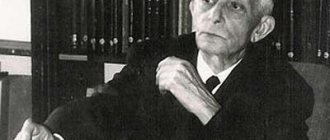Content
- 1 Description of the technique
- 2 History of creation 2.1 The first MMQ personality questionnaire
- 2.2 Second MPI Personality Inventory
- 2.3 Third EPI Personality Inventory
- 2.4 EPQ Fourth Personality Questionnaire
- 4.1 MPI key
- 5.1 MPI
- 6.1 Extraversion - introversion
- 7.1 According to Eysenck
- 8.1 Text of the MPI questionnaire
Impact on humans
As you probably already guessed, such a psychological manifestation does not happen without consequences. And almost all of them are of a negative nature. Moreover, most often it is not only the person himself who suffers, but also those around him. Here is a list of the main negative factors in everyday life:
- Difficulty of social adaptation.
It becomes problematic for you to even just contact other people, not to mention joining the team at work. Most of those around him consider such a person to be at least poorly educated.
In the worst case, rumors will begin to arise about hysteria and the presence of serious mental problems. Of course, this will not do you any good, but will only worsen an already strained relationship.
Giphy
- Inability to soberly assess the situation.
When even the slightest incident causes you to panic, it is almost impossible to move on. A person begins to sincerely believe that the whole world is against him, and a real apocalypse has come. Of course, because of this we give up. The already distant goal moves further away, and you believe in your own absolute helplessness.
- High risk of developing complexes.
Anxiety against the background of neuroticism is also associated with the assessment of appearance. If you constantly look at yourself exclusively from a critical side, trying to detect imperfections in your face and figure, then all this will quickly turn into powerful complexes.
And even compliments from other people will be perceived as lies against the backdrop of pity and outright flattery. And here it’s not far from problems of an intimate nature.
- Lack of a full personal life.
Often people with pronounced symptoms of neuroticism admit that they cannot undress in front of their partner, since any imperfection, which no one even thinks of considering as a flaw, provokes terrible embarrassment and fear of a completely normal figure.
The standard continuation of the situation is separation, divorce and lack of intimate life due to non-acceptance of one’s own body.
- Pathological jealousy.
Few women have not encountered the real embodiment of folklore Othello at least once in their lives. And few people like scenes of wild jealousy out of the blue. However, neuroticism may well be the cause of this behavior.
A person is very worried about his partner, has a lot of complexes, and is not confident in his own attractiveness and ability in bed. The result is regular scandals, shouting and complaints.
What do we have as a result? Typical toxic relationships that you should run away from as soon as the first alarm bell appears. And such jealousy will never disappear. It is simply pointless to hope that the situation will change for the better.
Photo by Mikhail Nilov: Pexels
- Physical discomfort.
Any psychological problem has a strong negative impact on health. Constant anxiety is a direct path to headaches and even chronic migraines.
This is not a complete list of problems that follow on the heels of neuroticism. Yes, it happens all the time. But it is precisely the pronounced form that brings a person nothing but misfortune and inconvenience.
History of creation
The first MMQ personality questionnaire
MMQ
(Maudsley Medical Questionnaire, from the name of the clinic where Eysenck worked) - a technique proposed in 1947. It was intended to diagnose neuroticism. The questionnaire consists of 40 statements with which the subject is asked to agree (yes) or disagree (no).
Statements were selected from questionnaires already known by that time, and the author relied on clinical descriptions of neurotic disorders. The MMQ was standardized on the basis of a survey of two groups: “neurotics” (1 thousand people) and “normal” (1 thousand people). A detailed analysis of the responses received for each MMQ statement (taking into account differences in psychiatric diagnoses) showed that using the questionnaire, two types of neurotic disorders can be differentiated - hysterical and dysthymic. Based on these results, G. Eysenck suggested that the answers to the MMQ statements will make it possible to draw a conclusion about the position of the subject on the scale of another personality dimension postulated by this researcher - extraversion - introversion. This began work on the construction of a new personality questionnaire. As a result, the MMQ did not find any use in psychodiagnostic research.
Second MPI Personality Inventory
MPI
(Maudsley Personality Inventory) is a personality questionnaire published in 1956. It consists of two internal scales: extraversion-introversion and neuroticism, with 24 questions for each scale. Later, 2 empty “masking questions” and 20 questions were also added to form a scale of the subject’s sincerity. There are three answer options: Yes (2 points), Don't know (1 point) and No (0 points). Practical use of MPI has shown significant discrepancies between the data obtained and the author's theoretical predictions (especially in clinical groups).
Third Personality Inventory EPI
EPI
(Eysenck Personality Inventory) was published in 1963 and contains 57 questions, 24 of which are aimed at identifying extraversion-introversion, 24 others - at assessing emotional stability-instability (neuroticism), the remaining 9 constitute a control group of questions designed to assess the sincerity of the subject , its relationship to the survey and the reliability of the results.
G. Eysenck developed two versions of this technique (A and B), which differ only in the text of the questionnaire. The instruction, key and data processing are duplicated. The presence of two forms allows the psychologist to conduct repeated research.
Adapted in Russia by A.G. Shmelev.
EPQ Personality Questionnaire Four
EPQ
(Eysenck Personality Questionnaire) is the result of further research work by Hans and Sibylle Eysenck. The EPQ was created in 1968 based on the PEN (Psychoticism, Extraversion, and Neuroticism) model proposed by the authors. Thus, a third factor, “psychoticism,” was added to the two-dimensional structure of the previous questionnaires, without changing the original “two-axis concept.
The EPQ consists of 91 statements, to which a further 10 “empty” statements can be added (items 92 to 101).
When is Neuroticism Treatment Necessary?
In psychiatry, neuroticism is not considered a pathological disorder. However, the neurotic himself may feel the need for psychological correction during periods of emotional instability. Pharmacology relieves anxiety well. However, the pills can reduce the level of neuroticism only for the duration of their effect.
The best long-term results can be achieved with a combination of psychotherapy and medication. In the fight against neuroticism, the Unified Protocol, developed by a prominent American specialist in the field of psychiatry, David Barlow, within the framework of the cognitive-behavioral approach, has proven itself well.
Theoretical basis
G. Eysenck, having analyzed the materials of a survey of 700 neurotic soldiers, came to the conclusion that the entire set of traits that describe a person can be represented through 2 main factors: extraversion (introversion) and neuroticism.
The first of these factors is biopolar and represents a characteristic of a person’s individual psychological make-up, the extreme poles of which correspond to the personality’s orientation either to the world of external objects (extraversion) or to the subjective inner world (introversion). It is generally accepted that extroverts are characterized by sociability, impulsiveness, behavioral flexibility, great initiative (but little persistence) and high social adaptability. Introverts, on the contrary, are characterized by unsociability, isolation, social passivity (with sufficient persistence), a tendency to introspection and difficulties in social adaptation.
The second factor - neuroticism (or neuroticism) - describes a certain property-state that characterizes a person in terms of emotional stability, anxiety, level of self-esteem and possible autonomic disorders. This factor is also bipolar and forms a scale, at one pole of which there are people characterized by extreme stability, maturity and excellent adaptation, and at the other - an extremely nervous, unstable and poorly adapted type. Most people are located between these poles, closer to the middle (according to the normal distribution).
The intersection of these 2 bipolar characteristics allows us to obtain an unexpected and rather interesting result - a fairly clear assignment of a person to one of the four 4 temperaments.
The third factor - psychoticism - was added in the fourth version of the questionnaire and is a characteristic of a tendency towards antisocial behavior and inadequacy of emotional reactions. This factor is not bipolar; its high values may indicate difficulty in social adaptation, although there is no clear justification for the legitimacy of identifying this category, and it is disputed by many foreign researchers.
Consequences of high levels of neuroticism
Depression - what is it in psychology
Neuroticism is considered in psychology as one of the leading causes of the development of various forms of psychopathology: anxiety disorders, chemical addictions, somatic diseases, eating disorders. Clinically significant episodes of anxiety and depressive mood represent the overlap of stressors with neuroticism as a personality trait.
Substance abuse is often an attempt to manage high levels of neuroticism. Also, a number of physical diseases (cardiovascular pathologies, eczema, dermatitis, irritable bowel syndrome) are associated with this mental characteristic.
A high level of neuroticism negatively affects a person’s mental and physical health
Additional Information. A high level of neuroticism affects the occurrence of somatic diseases both directly and indirectly. On the one hand, it weakens the body’s protective function, contributing to the development of such conditions. On the other hand, neuroticism makes you exaggerate the importance of physical diseases and respond inadequately to their treatment.
Severe neuroticism leads to a decrease in quality of life in general. This is one of the factors that negatively affects a person’s ability to work due to his constant emotional concern, distraction, mental and physical exhaustion. A high degree of neuroticism can lead to the destruction of significant social connections, as it often causes dissatisfaction with relationships and attacks of unmotivated hostility.
Processing the results
MPI key
Answers that match the key are scored 2 points, “I don’t know” - 1 point, and answers that do not match - 0 points.
| Scale | Direct statements | Converse statements |
| Extroversion - introversion | 2, 3, 6, 9, 13, 21, 32, 40, 42, 43, 47, 51, 52, 55, 60, 70 | 1, 14, 20, 27, 37, 63, 66, 67 |
| Neuroticism | 4, 10, 11, 16, 17, 18, 23, 24, 25, 28, 30, 33, 34, 38, 44, 46, 49, 54, 57, 58, 59, 62, 64, 68 | |
| Lie scale | 5, 12, 19, 29, 35, 39, 56, 65 | 8, 15, 22, 26, 31, 41, 45, 48, 50, 53, 61, 69 |
EPI Key
Answers that match the key are worth 1 point.
| Scale | Direct statements | Converse statements |
| Extroversion - introversion | 1, 3, 8, 10, 13, 17, 22, 25, 27, 39, 44, 46, 49, 53, 56 | 5, 15, 20, 29, 32, 34, 37, 41, 51 |
| Neuroticism | 2, 4, 7, 9, 11, 14, 16, 19, 21, 23, 26, 28, 31, 33, 35, 38, 40, 43, 45, 47, 50, 52, 55, 57 | |
| Lie scale | 6, 24, 36 | 12, 18, 30, 42, 48, 54 |
EPQ key
Answers that match the key are worth 1 point.
| Scale | Direct statements | Converse statements |
| Extroversion - introversion | 1, 5, 10, 15, 18, 26, 34, 38, 42, 50, 54, 58, 62, 65, 70, 74, 77, 81, 90, 92, 96 | 22, 30, 46, 84 |
| Neuroticism | 3, 7, 12, 16, 20, 24, 28, 32, 36, 40, 44, 48, 52, 56, 60, 64, 68, 72, 75, 79, 83, 86, 89, 94, 98 | |
| Psychoticism | 14, 23, 27, 31, 35, 47, 51, 55, 71, 85, 88, 93, 97 | 2, 6, 9, 11, 19, 39, 43, 59, 63, 67, 78, 100 |
| Lie scale | 13, 21, 33, 37, 61, 73, 87, 99 | 4, 8, 17, 25, 29, 41, 45, 49, 53, 57, 66, 69, 76, 80, 82, 91, 95 |
Start taking the test (Eysenck personality questionnaire)
Time limit: 0
Navigation (job numbers only)
0 of 101 tasks completed
Questions:
- 1
- 2
- 3
- 4
- 5
- 6
- 7
- 8
- 9
- 10
- 11
- 12
- 13
- 14
- 15
- 16
- 17
- 18
- 19
- 20
- 21
- 22
- 23
- 24
- 25
- 26
- 27
- 28
- 29
- 30
- 31
- 32
- 33
- 34
- 35
- 36
- 37
- 38
- 39
- 40
- 41
- 42
- 43
- 44
- 45
- 46
- 47
- 48
- 49
- 50
- 51
- 52
- 53
- 54
- 55
- 56
- 57
- 58
- 59
- 60
- 61
- 62
- 63
- 64
- 65
- 66
- 67
- 68
- 69
- 70
- 71
- 72
- 73
- 74
- 75
- 76
- 77
- 78
- 79
- 80
- 81
- 82
- 83
- 84
- 85
- 86
- 87
- 88
- 89
- 90
- 91
- 92
- 93
- 94
- 95
- 96
- 97
- 98
- 99
- 100
- 101
Information
Answer questions sincerely. There are no “bad” or “good” options here. The main thing is to mark the one that is closest to you. This is the only way you can get accurate results that reflect your unique features. There is no time limit for taking the test, but try not to delay in choosing an option, answer “from the heart.”
You have already taken the test before. You can't start it again.
The test is loading...
You must log in or register in order to begin the test.
You must complete the following tests to start this one:
results
Your time:
Time's up
Categories
- Introversion - Extraversion Scale 0%
- Insincerity scale 0%
- Neuroticism scale 0%
- Psychoticism scale 0%
- First of all, pay attention to insincerity scale. If received the result exceeds 40%, it means you didn’t answer sincerely enough. Try taking the test again, answering the questions more frankly. If you are sure that you answered all the questions honestly, then perhaps you are just an ideal person for whom the questionnaire is not designed =)
High scores on introversion-extroversion scale correspond to an extroverted personality type, low ones - to an introverted one. Average values are 27-62%.High scores on the neuroticism scale indicate a high level of mental instability. Characteristic features: restlessness, anxiety, resentment. Average values are 33-66%.
High scores on the psychoticism scale indicate high conflict. In this case, working with people may be contraindicated. Average values are 20-48%.
To determine temperament , use the Eysenck circle .
A sanguine person is defined by high scores on extraversion and low scores on neuroticism.
Phlegmatic – low scores on extraversion and low on neuroticism.
Choleric – high scores on extraversion and high on neuroticism.
Melancholic – low scores on extraversion and high on neuroticism.
Average values indicate a mixed type of temperament. For example, average scores on extraversion and high scores on neuroticism mean that your temperaments are melancholic and choleric.
PS Don't take the test results too seriously. Only a specialist (psychologist or psychotherapist) can determine your temperament type as reliably as possible.
- 1
- 2
- 3
- 4
- 5
- 6
- 7
- 8
- 9
- 10
- 11
- 12
- 13
- 14
- 15
- 16
- 17
- 18
- 19
- 20
- 21
- 22
- 23
- 24
- 25
- 26
- 27
- 28
- 29
- 30
- 31
- 32
- 33
- 34
- 35
- 36
- 37
- 38
- 39
- 40
- 41
- 42
- 43
- 44
- 45
- 46
- 47
- 48
- 49
- 50
- 51
- 52
- 53
- 54
- 55
- 56
- 57
- 58
- 59
- 60
- 61
- 62
- 63
- 64
- 65
- 66
- 67
- 68
- 69
- 70
- 71
- 72
- 73
- 74
- 75
- 76
- 77
- 78
- 79
- 80
- 81
- 82
- 83
- 84
- 85
- 86
- 87
- 88
- 89
- 90
- 91
- 92
- 93
- 94
- 95
- 96
- 97
- 98
- 99
- 100
- 101
- With answer
- With a viewing mark
- Task 1 of 101
1.
You have many different hobbies.
- Task 2 of 101
2.
You think ahead about what you are going to do.
- Task 3 of 101
3.
You often have ups and downs in your mood.
- Task 4 of 101
4.
Have you ever claimed credit for something another person actually did?
- Task 5 of 101
5.
You are a talkative person.
- Task 6 of 101
6.
You would be worried about getting into debt.
- Task 7 of 101
7.
You had to feel like an unhappy person for no particular reason.
- Task 8 of 101
8.
Have you ever been greedy in order to get more than what you were entitled to?
- Task 9 of 101
9.
You carefully lock the door at night.
- Task 10 of 101
10.
You consider yourself a cheerful person.
- Task 11 of 101
11.
Seeing how a child or an animal suffers, you would be very upset.
- Task 12 of 101
12.
You often worry that you have done or said something that you should not have done or said.
- Task 13 of 101
13.
You always keep your promises, even if it is very inconvenient for you personally.
- Task 14 of 101
14.
You would have fun skydiving.
- Task 15 of 101
15.
Are you able to give free rein to your feelings and have a lot of fun in a noisy company?
- Task 16 of 101
16.
You are irritable.
- Task 17 of 101
17.
Have you ever blamed someone for something that you yourself were guilty of?
- Task 18 of 101
18.
You enjoy meeting new people.
- Task 19 of 101
19.
You believe in the benefits of insurance.
- Task 20 of 101
20.
Are you easily offended?
- Task 21 of 101
21.
All your habits are good and desirable.
- Task 22 of 101
22.
You try to keep a low profile when in society.
- Task 23 of 101
23.
Would you take drugs that could put you in an unusual or dangerous state (alcohol, drugs)?
- Task 24 of 101
24.
You often experience a state where you are tired of everything.
- Task 25 of 101
25.
Have you ever taken something that belonged to another person, even something as small as a pin or button?
- Task 26 of 101
26.
You like to visit people often and be social.
- Task 27 of 101
27.
You take pleasure in hurting those you love.
- Task 28 of 101
28.
You are often bothered by feelings of guilt.
- Task 29 of 101
29.
You had to talk about something you are not good at.
- Task 30 of 101
30.
You usually prefer books to meeting people.
- Task 31 of 101
31.
You have obvious enemies.
- Task 32 of 101
32.
Would you call yourself a nervous person?
- Task 33 of 101
33.
You always apologize when you are rude to someone else.
- Task 34 of 101
34.
You have many friends.
- Task 35 of 101
35.
You like to pull pranks and pranks that can sometimes really hurt people.
- Task 36 of 101
36.
Are you a restless person?
- Task 37 of 101
37.
As a child, you always meekly and immediately did what you were ordered.
- Task 38 of 101
38.
You consider yourself a carefree person.
- Task 39 of 101
39.
How much do good manners and cleanliness mean to you?
- Task 40 of 101
40.
Do you worry about any terrible things that could have happened but didn't?
- Task 41 of 101
41.
Have you ever broken or lost someone else's thing?
- Task 42 of 101
42.
You are usually the first to take the initiative when meeting people.
- Task 43 of 101
43.
You can easily understand a person's condition if he shares his worries with you.
- Task 44 of 101
44.
Your nerves are often stretched to the limit.
- Task 45 of 101
45.
Will you throw unnecessary paper on the floor if you don't have a basket at hand?
- Task 46 of 101
46.
You are more silent when around other people.
- Task 47 of 101
47.
Do you think marriage is old-fashioned and should be abolished?
- Task 48 of 101
48.
You sometimes feel sorry for yourself.
- Task 49 of 101
49.
You sometimes brag a lot.
- Task 50 of 101
50.
You can easily add some life to a rather dull crowd.
- Task 51 of 101
51.
Do careful drivers annoy you?
- Task 52 of 101
52.
You are worried about your health.
- Task 53 of 101
53.
Have you ever spoken badly about another person?
- Task 54 of 101
54.
You love to tell jokes and anecdotes to your friends.
- Task 55 of 101
55.
Most foods taste the same to you.
- Task 56 of 101
56.
Do you sometimes have a bad mood?
- Task 57 of 101
57.
Have you ever been rude to your parents as a child?
- Task 58 of 101
58.
You enjoy communicating with people.
- Task 59 of 101
59.
You worry if you find out that you made mistakes in your work.
- Task 60 of 101
60.
You suffer from insomnia.
- Task 61 of 101
61.
You always wash your hands before eating.
- Task 62 of 101
62.
You are one of those people who do not mince words.
- Task 63 of 101
63.
You prefer to arrive at your meeting a little earlier than scheduled.
- Task 64 of 101
64.
You feel lethargic and tired for no reason.
- Task 65 of 101
65.
Have you ever cheated in a game?
- Task 66 of 101
66.
You enjoy work that requires quick action.
- Task 67 of 101
67.
Your mother is a good person (was a good person).
- Task 68 of 101
68.
Often you feel that life is terribly boring.
- Task 69 of 101
69.
Have you ever taken advantage of another person's mistake to your advantage?
- Task 70 of 101
70.
You often take on more than time allows.
- Task 71 of 101
71.
There are people who try to avoid you.
- Task 72 of 101
72.
You care a lot about your appearance.
- Task 73 of 101
73.
You are always polite, even with unpleasant people.
- Task 74 of 101
74.
You believe that people spend too much time securing their future by saving, insuring themselves and their lives.
- Task 75 of 101
75.
Have you ever had a desire to die?
- Task 76 of 101
76.
You would try to avoid paying taxes on extra earnings if you were confident that you would never be caught doing so.
- Task 77 of 101
77.
You can bring revitalization to a company.
- Task 78 of 101
78.
You try not to be rude to people.
- Task 79 of 101
79.
You worry for a long time after the embarrassment that happened.
- Task 80 of 101
80.
Have you ever insisted on having things your way?
- Task 81 of 101
81.
You often arrive at the station at the last minute before the train leaves.
- Task 82 of 101
82.
Have you ever intentionally said something unpleasant or offensive to someone?
- Task 83 of 101
83.
Your nerves were bothering you.
- Task 84 of 101
84.
It is unpleasant for you to be among people who make fun of your comrades.
- Task 85 of 101
85.
You easily lose friends through your own fault.
- Task 86 of 101
86.
You often feel lonely.
- Task 87 of 101
87.
Your words always match your deeds.
- Task 88 of 101
88.
Do you sometimes like to tease animals?
- Task 89 of 101
89.
You are easily offended by comments about you personally and your work.
- Task 90 of 101
90.
Life without any danger would seem too boring to you.
- Task 91 of 101
91.
Have you ever been late for a date or work?
- Task 92 of 101
92.
You enjoy the bustle and excitement around you.
- Task 93 of 101
93.
You want people to be afraid of you.
- Task 94 of 101
94.
Is it true that sometimes you are full of energy and everything is burning in your hands, and sometimes you are completely lethargic?
- Task 95 of 101
95.
You sometimes put off until tomorrow what you should do today.
- Task 96 of 101
96.
Are you considered a lively and cheerful person?
- Task 97 of 101
97.
Do they often tell you lies?
- Task 98 of 101
98.
You are very sensitive to certain phenomena, events, things.
- Task 99 of 101
99.
You are always ready to admit your mistakes.
- Task 100 of 101
100.
Have you ever felt sorry for an animal that fell into a trap?
- Task 101 of 101
Interpretation of results
MPI
Extraversion:
- from 32 to 48 - “pure” extrovert
- from 16 to 32 - ambivalence, uncertainty
- from 0 to 16 - “pure” introvert
Neuroticism:
- from 32 to 48 - pronounced neuroticism
- from 16 to 32 - average score
- from 0 to 16 - emotional stability
Lie:
- more than 20 - absolute unreliability of the results
- from 16 to 20 - a dubious result
- from 5 to 15 points - reliable result
- 4 points or less - questionable result
EPI
Extraversion:
- over 19 - bright extrovert,
- over 15 - extrovert
- 12 - average value,
- less than 9 - introvert,
- less than 5 - deep introvert.
Neuroticism:
- more than 19 – very high level of neuroticism,
- more than 14 – high level of neuroticism,
- 9 - 13 - average value,
- less than 7 – low level of neuroticism.
Lie:
- more than 4 - insincerity in answers, which also indicates some demonstrative behavior and the subject’s focus on social approval,
- less than 4 is normal.
EPQ
Extraversion:
- more than 15 - “pure” extrovert
- from 7 to 15 - ambivalence, uncertainty
- from 0 to 6 - “pure” introvert
Neuroticism:
- more than 16 - pronounced neuroticism
- from 8 to 16 - average score
- from 0 to 7 - emotional stability
Psychoticism:
- more than 10 - working with people is contraindicated
- from 6 to 10 - there is a tendency towards emotional inadequacy
- from 0 to 5 - absent
Lie:
- more than 10 - unreliable result
Causes of Neuroticism
Archetype - what is it in psychology and philosophy
Neuroticism is considered not only a genetically determined property of the psyche. An impressive number of studies indicate the presence of its precursors in childhood. A person who regularly experienced feelings of insecurity and helplessness in childhood is more likely to develop a high level of neuroticism. Being exposed to the slightest stress in adulthood, such a person will involuntarily fall into a childish state and re-experience all the horror of a small and defenseless child in the face of dangers.
Description of scales
Extroversion - introversion
Characterizing a typical extrovert, the author notes his sociability and outward orientation of the individual, a wide circle of acquaintances, and the need for contacts. He acts under the influence of the moment, is impulsive, quick-tempered, carefree, optimistic, good-natured, and cheerful. Prefers movement and action, tends to be aggressive. Feelings and emotions are not strictly controlled, and he is prone to risky actions. You can't always rely on him.
A typical introvert is a quiet, shy, introjective person who is prone to introspection. Reserved and distant from everyone except close friends. Plans and thinks about his actions in advance, does not trust sudden impulses, takes decisions seriously, loves order in everything. He controls his feelings and is not easily angered. He is pessimistic and highly values moral standards.
Neuroticism
Characterizes emotional stability or instability (emotional stability or instability). Neuroticism, according to some data, is associated with indicators of nervous system lability. Emotional stability is a trait that expresses the preservation of organized behavior and situational focus in normal and stressful situations. Characterized by maturity, excellent adaptation, lack of great tension, anxiety, as well as a tendency to leadership and sociability. Neuroticism is expressed in extreme nervousness, instability, poor adaptation, a tendency to quickly change moods (lability), feelings of guilt and anxiety, preoccupation, depressive reactions, absent-mindedness, instability in stressful situations. Neuroticism corresponds to emotionality and impulsiveness; unevenness in contacts with people, variability of interests, self-doubt, pronounced sensitivity, impressionability, tendency to irritability. A neurotic personality is characterized by inappropriately strong reactions in relation to the stimuli that cause them. Individuals with high scores on the neuroticism scale may develop neurosis in unfavorable stressful situations.
The results on the extraversion and neuroticism scales are presented using a coordinate system. The interpretation of the results obtained is carried out on the basis of the psychological characteristics of the individual corresponding to one or another square of the coordinate model, taking into account the degree of expression of individual psychological properties and the degree of reliability of the data obtained.
Psychoticism
This scale indicates a tendency to antisocial behavior, pretentiousness, inappropriate emotional reactions, high conflict, lack of contact, self-centeredness, selfishness, and indifference. According to Eysenck, high scores on extraversion and neuroticism correspond to a psychiatric diagnosis of hysteria, and high scores on introversion and neuroticism correspond to a state of anxiety or reactive depression. Neuroticism and psychoticism, in the case of the severity of these indicators, are understood as a “predisposition” to the corresponding types of pathology.
Neurophysiological explanation of neuroticism
Self-control - what is it in psychology, definition
The level of neuroticism in an individual primarily depends on the innate characteristics of his sympathetic and parasympathetic nervous systems, which are functionally opposed to each other.
The sympathetic nervous system is activated in stressful situations. Causes what is called in psychology the “fight or flight” response. Leads to increased blood pressure, increased sweating, increased breathing and heart rate. The parasympathetic nervous system eliminates the effects of the sympathetic nervous system and returns the body to a normal state.
The degree of severity of neuroticism depends on the innate characteristics of the nervous system
When, due to the innate characteristics of the body, the sympathetic nervous system works more actively, excitation occurs easily and quickly, and inhibition is delayed over time. As a result, a person acquires neurotic traits.
Personality typology
According to Eysenck
Drawing on data from the physiology of higher nervous activity, Eysenck hypothesizes that strong and weak types, according to Pavlov, are very close to extroverted and introverted personality types. The nature of introversion and extraversion is seen in the innate properties of the central nervous system, which ensure the balance of the processes of excitation and inhibition.
Thus, using survey data on the scales of extraversion, introversion and neuroticism, it is possible to derive indicators of personality temperament according to the classification of Pavlov, who described four classical types: sanguine (according to the basic properties of the central nervous system is characterized as strong, balanced, mobile), choleric (strong, unbalanced, mobile), phlegmatic (strong, balanced, inert), melancholic (weak, unbalanced, inert).
"Pure" sanguine person
quickly adapts to new conditions, quickly gets along with people, and is sociable. Feelings arise and change easily, emotional experiences are usually shallow. Facial expressions are rich, mobile, expressive. He is somewhat restless, needs new impressions, does not sufficiently regulate his impulses, and does not know how to strictly adhere to the established routine, life, or work system. In this regard, he cannot successfully carry out work that requires an equal expenditure of effort, prolonged and methodical tension, perseverance, stability of attention, and patience. In the absence of serious goals, deep thoughts, and creative activity, superficiality and inconstancy are developed.
Choleric
characterized by increased excitability, actions are intermittent. He is characterized by sharpness and swiftness of movements, strength, impulsiveness, and vivid expression of emotional experiences. Due to imbalance, carried away by a task, he tends to act with all his might and become more exhausted than he should. Having public interests, his temperament shows initiative, energy, and integrity. In the absence of spiritual life, choleric temperament often manifests itself in irritability, efficiency, lack of restraint, hot temper, and inability to self-control under emotional circumstances.
Phlegmatic person
characterized by a relatively low level of behavioral activity, new forms of which are developed slowly but are persistent. Possesses slowness and calmness in actions, facial expressions and speech, evenness, constancy, depth of feelings and moods. A persistent and persistent “worker of life”, he rarely loses his temper, is not prone to emotions, having calculated his strength, gets things done to the end, is even in relationships, moderately sociable, and does not like to chat in vain. Saves energy and doesn’t waste it. Depending on the conditions, in some cases a phlegmatic person may be characterized by “positive” traits - endurance, depth of thoughts, constancy, thoroughness, etc., in others - lethargy, indifference to the environment, laziness and lack of will, poverty and weakness of emotions, a tendency to perform just habitual actions.
Melancholic.
His reaction often does not correspond to the strength of the stimulus; there is depth and stability of feelings with weak expression. It is difficult for him to concentrate on something for a long time. Strong influences often cause a prolonged inhibitory reaction in a melancholic person (give up). He is characterized by restraint and subdued motor skills and speech, shyness, timidity, and indecisiveness. Under normal conditions, a melancholic person is a deep, meaningful person who can be a good worker and successfully cope with life’s tasks. Under unfavorable conditions, he can turn into a closed, fearful, anxious, vulnerable person, prone to difficult internal experiences of life circumstances that do not deserve it at all.
According to Sukhodolsky
On the other hand, as a rule, one should talk about the predominance of certain temperamental traits, since in life they are rarely found in their pure form. That is why G.V. Sukhodolsky believes that it is necessary to distinguish not four (“pure” types - this is an abstraction), but nine personality types: the norm and eight accentuations. In addition to the four “pure” types G.V. Sukhodolsky proposed four “intermediate” ones:
- choleric-sanguine (i.e. “pure” extroverted in combination with an average score of neuroticism)
- sanguine-phlegmatic, (i.e. “stable” type combined with extraversion-introversion ambivalence)
- phlegmatic-melancholic, (i.e. “pure” introverted in combination with an average neuroticism score)
- melancholic-choleric, (i.e. “neurotic” type combined with extraversion-introversion ambivalence)
- normal type.
According to G.V. Sukhodolsky, the typology of G. Eysenck, can be represented in the form of a matrix, the rows of which characterize the orientation (introversion; average values; extraversion), the columns correspond to the levels of emotional stability (neuroticism; average values; stability), and the elements - statistically normal and deviating types .
Each personality type corresponds to the following external manifestations:
- Choleric (X)
– aggressive, hot-tempered, changing his views/impulsive. - Choleric-sanguine (CS) type
– optimistic, active, extroverted, sociable, accessible. - Sanguine (S)
– talkative, quick to react, relaxed, lively. - Sanguine-phlegmatic (SP) type
– carefree, leading, stable, calm, balanced. - Phlegmatic (F)
– reliable, self-controlled, peaceful, reasonable. - The phlegmatic-melancholic (FM) type
is diligent, passive, introverted, quiet, uncommunicative. - Melancholic (M)
– reserved, pessimistic, sober, rigid. - Melancholic-choleric (MX) type
– conscientious, capricious, neurotic, touchy, restless. - Normal type (N)
.
What is neuroticism
Neuroticism in psychology is not a mental disorder, not a disease. It should not be identified with neurosis. Symptoms of neuroticism can also be observed in a healthy person, being specific personality traits. Its three main components are a feeling of vulnerability, insecurity, increased excitability and excessive emotionality.
In the broadest sense of the word, neuroticism is an inability for emotional self-regulation, an inability to cope with one’s negative feelings. A person with a high level of neuroticism is often completely overwhelmed by pessimism, fear, irritation and anxiety in response to the most insignificant events. At the same time, he is completely unable to use these states to resolve the problems that have arisen.
In fact, any event, even a positive one, will cause negative experiences in a neurotic. For example, finding a marriage partner will be overshadowed by fears about his possible loss, concluding a profitable business contract will be marred by a premonition of failure and the resulting financial difficulties.
Note! The experiences of a person with severe neuroticism often do not correspond to reality. The emergence of negative emotions is associated not only with real undesirable events, but also with general pessimism and a low level of adaptability of his psyche.
A neurotic person tends to exaggerate the scale of the disaster
At the physical level, neuroticism can manifest itself in an increase in the number of somatic complaints (migraines, pain in the heart and stomach, sleep disturbances, attacks of limb tremors).









